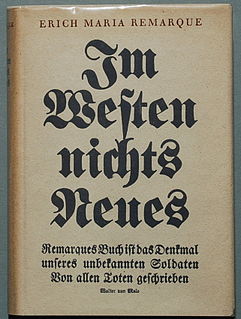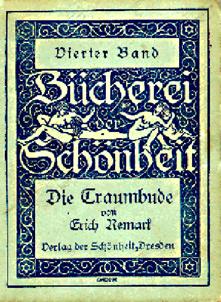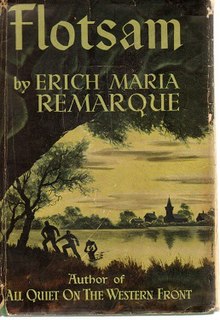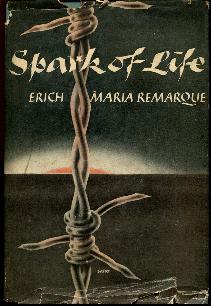 W
WAll Quiet on the Western Front is a novel by Erich Maria Remarque, a German veteran of World War I. The book describes the German soldiers' extreme physical and mental stress during the war, and the detachment from civilian life felt by many of these soldiers upon returning home from the front.
 W
WArch of Triumph is a 1945 novel by Erich Maria Remarque about stateless refugees in Paris before World War II. Written during his exile in the United States (1939–1948), it was his second worldwide bestseller after All Quiet on the Western Front. It was made into a feature film in 1948 and remade as a television film in 1985.
 W
WThe Black Obelisk is a novel written in 1956 by the German author Erich Maria Remarque. This novel paints a portrait of Germany in the early 1920s, a period marked by hyperinflation and rising nationalism.
 W
WThe Dream Room was Erich Maria Remarque's first novel, published under the name Erich Remark. He started writing it at the age of sixteen and completed it after his service in World War I, but it was not published until 1920.
 W
WFlotsam is a novel first published in 1939 by the German author Erich Maria Remarque. The novel describes the interwoven stories of several immigrants who left Germany at the time of National Socialism.
 W
WHeaven Has No Favorites is a novel by the German writer Erich Maria Remarque. This novel is a story about passion and love, set in 1948 with a background of automobile racing. Inspired by racing driver Alfonso de Portago.
 W
WThe Night in Lisbon is a novel by Erich Maria Remarque published in 1962. It revolves around the plight of two German refugees in the opening months of World War II. One of the refugees relates their story during the course of a single night in Lisbon in 1942. The story he recounts is mainly a romantic one, and also contains a lot of action with arrests, escapes and near-misses. The novel is realistic, Remarque was himself a German refugee, and provides insight into refugee life in Europe during the early days of the war. The book completed what was known as Remarque's "emigre trilogy" along with Flotsam and Arch of Triumph. It was Remarque's last completed work.
 W
WThe Road Back is a novel by German author Erich Maria Remarque, commonly regarded as a sequel to his 1929 novel All Quiet on the Western Front. It was first serialized in the German newspaper Vossische Zeitung between December 1930 and January 1931, and published in book form in April 1931.
 W
WSpark of Life is a novel by Erich Maria Remarque, which appeared both in German and in English in 1952.
 W
WStation at the Horizon is a novel by Erich Maria Remarque, a German veteran of World War I. The book describes the search for love of an ex-soldier and an ex-race car driver, Kai, who is torn between Barbara, a girl from the village, Maud, an American middle-class woman, and Lilian Dunquerke, a countess.
 W
WThree Comrades is a novel first published in 1936 by the German author Erich Maria Remarque. It is written in first person by the main character Robert Lohkamp, whose somewhat disillusioned outlook on life is due to his horrifying experiences in the trenches of the First World War's French-German front. He shares these experiences with Otto Köster and Gottfried Lenz, his two comrades with whom he runs an auto-repair shop in late 1920s Berlin (probably). Remarque wrote the novel in exile and it was first published in Dutch translation as Drei kameraden, with English translation following soon in Good Housekeeping from January to March 1937 and in the book form in the same year. First German language edition was published in 1938 by exile publisher Querido in Amsterdam, but the novel was published in Germany only in 1951.